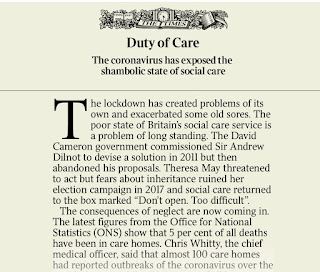When the bells strike midnight at the end of 31 December 2020, we will look back on one of the most amazing years ever in Britain. If we dare to look ahead – with, we hope, victory in the coronavirus war achieved – how will we define the 2020s? I have been reminiscing on the two decades following the two great wars – 1914-1918 and 1939-1945 - to see what we can glean from them.
 |
| Votes for women at last |
The decade that roared
The decade that followed the Great War is dubbed ‘The Roaring Twenties’ but that was not the whole story. It was a classic case of boom and bust. I was born in 1926 and at the end of the decade people were enjoying the benefits of new discoveries and development. Men returning from the trenches found it hard to be adjust to normal life while women’s service on the home front in the fields and in factories brought greater rights and independence at last by the Representation of People Acts 1918 and 1928. My 38 year old mother would have voted for the first time at the 1929 general election. (The first general election when every woman had the right to vote.)
 |
| 1920s: the birth of the BBC |
Electricity made housework easier with new machines and gadgets and the radio made life brighter for all. The private British Broadcasting Company was set up in 1922, becoming the state-owned British Broadcasting Corporation – the famous BBC - in 1926. It was another two years before our family had our first radio set powered by heavy 'wet batteries' that had to be taken to the shop to be recharged.
 |
| Foraging for coal, 1926 |
Economically, Britain was the richest country in Europe although those riches were not shared, as shown by the short-lived first general strike of 1926, the year I was born. The strike in May, intended to support the miners, ended in days, but the miners held out until the month I arrived, November. The 1920s ended on a gloomy note with the Wall Street Crash heralding the Great Depression and crises of the 1930s, with Britain again at war in 1939.
"Never had it so good": The Fifties
 |
| The Festival of Britain, 1951 |
The 1950s saw Britain emerge from the shadow of war to become a fairer, richer society. After six years of austerity adjusting to peacetime life after six years of war, the country decided it was time to celebrate. The Festival of Britain was an entertainment and art extravaganza based on the South Bank of the Thames in London, its centrepiece the £2 million Festival Hall. The biggest boost to entertainment came with the rapid expansion of television, suspended during the war. Not only did I enjoy watching it, I had a brief spell in the late 1950s as a BBC Wales television reporter. One of my assignments was reporting a massive mudslide from the Blaena colliery, a forerunner to the Aberfan disaster 10 years later.
 |
| How the nation watched the coronation, 1953. Photo: BBC |
Fashion became fashionable in the 1950s especially with teenagers and the cult of the teenage 'teddy boys' with their flashy clothes and outlandish behaviour. There was national celebration for the coronation of our Queen in 1953, watched on television by millions including Rosemary and me in our Caerphilly flat on our just-bought set.
 |
| Wales welcomes the Commonwealth |
Our health improved dramatically thanks to state welfare and the National Health Service, introduced by Aneurin Bevan in 1948. No doubt our health improved also when food rationing finally ended in 1954, after 14 years. The economy surged boosted by more jobs and higher wages. Wales added to the years' successes, hosting the Commonwealth Games in Cardiff in 1958.
The decade was aptly summed up by Prime Minister Harold Macmillan with his famous comment that 'Some people have never had it so good". So a happy, worthily memorable decade for Britain and the Skinners. Rosemary and I were married on 23 August 1952 to begin a marriage that lasted 66 years.































